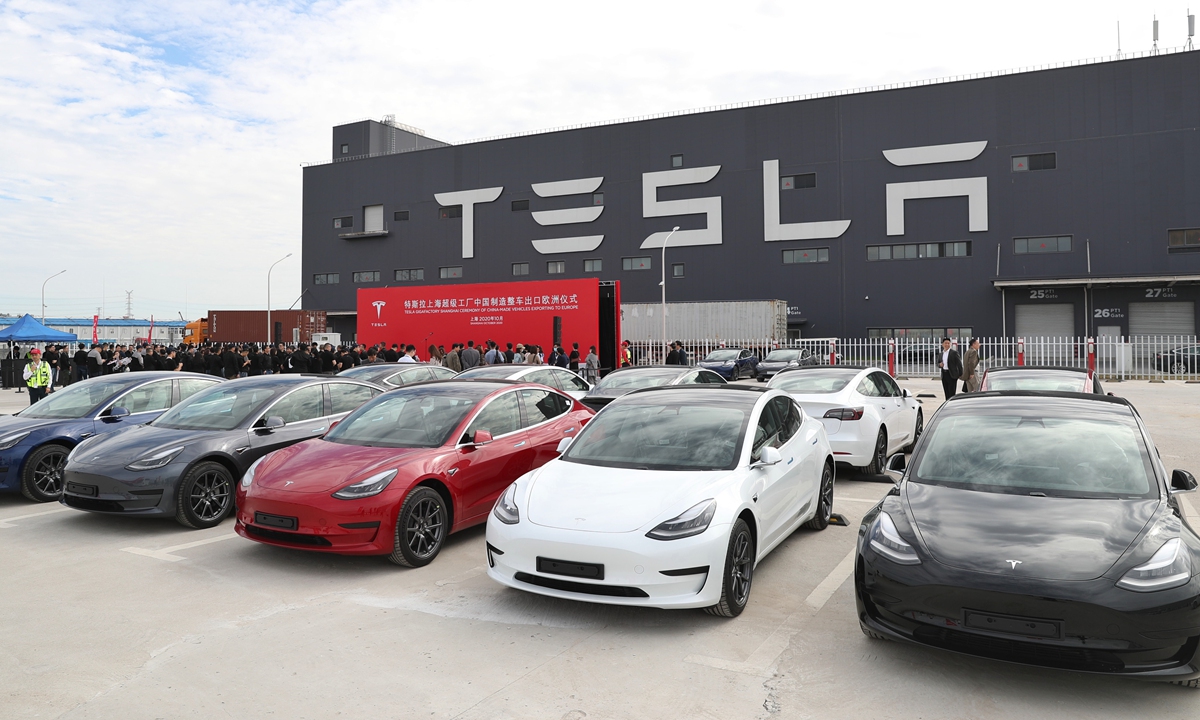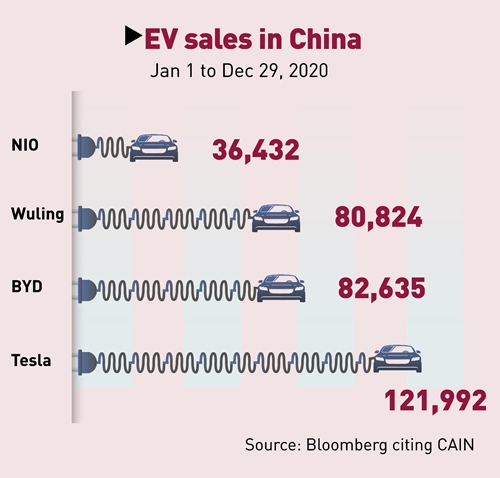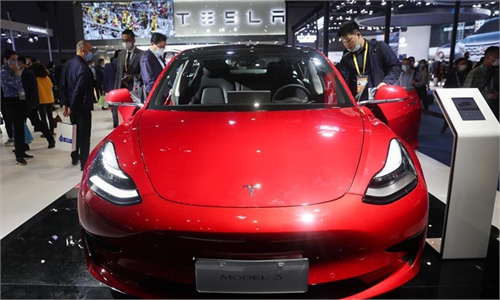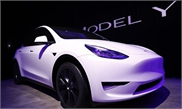New China-made Model Y surprises market with cheaper prices
Sales success overshadowed by quality concerns

Made-in-China Tesla cars wait to be shipped overseas outside its factory in Shanghai in October 2020. Photo:cnsphoto
Tesla has blazed a trail through the world's biggest electric vehicle market successfully in some areas in 2020, but not so smoothly in other areas.
Although the US electric car brand's impressive sales figures have been overshadowed by some doubts over the quality of its products and earlier interruptions from the coronavirus outbreak, the company has come to the end of its first year selling China-made cars with a commanding position in the country, showing the appeal of the 18-year-old new energy vehicle (NEV) brand to a market whose development of electric cars is rapid but still at an early stage.
Sale success
According to a report Tesla sent to the Global Times, the company produced and delivered a total of around 500,000 electric cars in 2020, which is "generally in line with" Tesla's expectations. The company also disclosed that its Shanghai plant has started mass producing Model Ys, and will begin deliveries in the short term.
Data released by the China Passenger Car Association also noted that Tesla sold 21,604 Model 3s in November, largely exceeding the sales of domestic popular NEV models such as Nio ES6 and Xiaopeng P7.
Behind the company's impressive sales record is its bold and aggressive approach in the Chinese market, from launching its first overseas Gigafactory in Shanghai and made-in-China Model 3 cars with a stunning speed, to launching Model Y series and the rapid expansion of its supercharger network in China.
On Friday, Tesla released its long-anticipated, made-in-China Model Y series to the Chinese market, at a price much lower than Tesla's official Chinese website had suggested it would cost.
According to Tesla's website, there would be two versions of the Model Y series. One is a performance version and the other is a long-range version. The two versions range in price from 339,900 yuan ($52,028) to 369,900 yuan.
The performance version had previously been expected to cost 535,000 yuan while the long-range version was expected to cost 488,000 yuan, according to sina.com.
The new prices - as much as 165,100 yuan lower than expected - caused heated discussions on Weibo, China's Twitter-like social media platform, with some users saying the prices show Tesla is a good company, while others saying the move is likely to create greater competition for Chinese domestic electric carmakers.
The surprising price has boosted the Model Y's orders, with the number of preorders hitting 100,000 within 10 hours, media outlets reported. However, citing a Tesla insider, yicai.com said the 100,000 number is exaggerated, adding that Model Y model cars will be sent to stores across China soon.
Independent car analyst Song Jin said that Tesla's lead in China's NEV market is due to "a mixture of" Tesla's advantages such as production automation, which has enhanced its manufacturing capacity, and its car production technique that the company has accumulated over years of development and cannot be easily imitated by other brands.
"Most domestic NEV companies are still using traditional car production lines, which lag behind companies like Tesla in manufacturing speed and technique. Besides, they don't have the kind of abundant capital like Tesla has to invest in their manufacturing lines," Song told the Global Times.
Car analyst Feng Shiming also noted that Tesla has created strong brand awareness, which has attracted many loyal customers in China. One person he knows, for example, ordered a China-made Model 3 as early as 2016. It's hard to imagine that customers would wait such a long time to purchase other brands' products.
Additionally, the Shanghai municipal government's support to the brand through subsidies and other policies, also helped increase Tesla's popularity among domestic customers, he said.

Quality concerns
However, along with the rise of Tesla there also come criticisms and doubts over its business structure. Recently, Chinese technology media Pinwan cited Tesla insiders as saying that the company is sacrificing the quality of its products in the pursuit of speed and production capacity. Tesla later refuted the accusations. Tesla's vice president Tao Lin later said on her Weibo account that she was ready to sue Pinwan.
Several safety incidents related to Tesla cars have also been reported in recent years. The latest was a video of a Model 3 accelerating in a tunnel while the driver's foot was "off the accelerator."
Tesla released the result of its probe on Saturday, stating that after analysis and onsite investigation, the acceleration was found to be due to the slope of the road which caused what it called geopotential energy. The company said it was in talks with the car owner.
Feng also said that he learned from people close to the company that Tesla might have problems meeting traditional quality inspection standards. "Using traditional (car parts) quality standards, many of Tesla's products might need to be reworked, but they don't have time for such work in their haste to fulfill the orders," he said.
Song noted that it's unlikely that questions about quality problems will hurt the brand's sales in the short term, not only because Tesla's automation capabilities will help them improve in quality control, but also because consumers usually have great tolerance to innovative brands, given that they all know NEVs are not totally mature yet.


